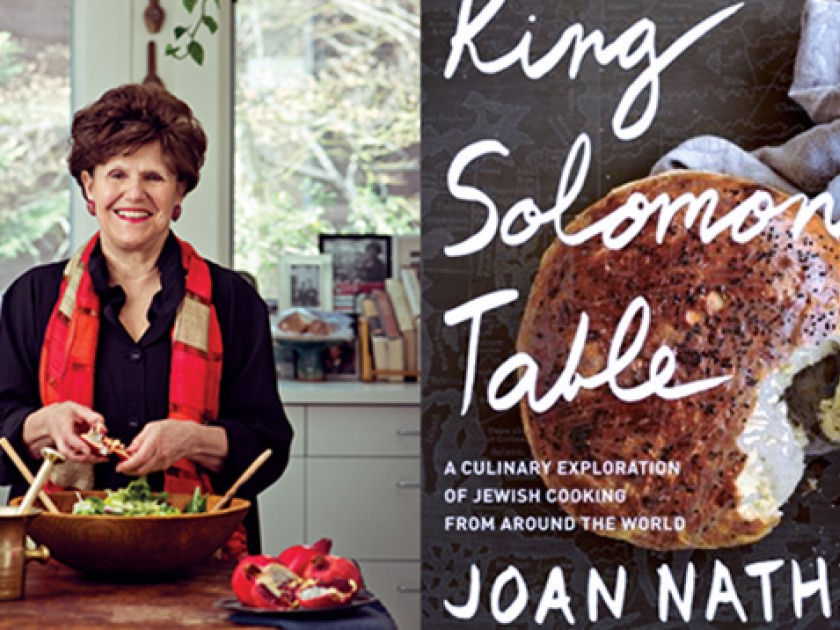Join a community of readers who are committed to Jewish stories
Sign up for JBC’s Nu Reads, a curated selection of Jewish books delivered straight to your door!

Joan Nathan has a new cookbook coming out this week! With the release of King Solomon’s Table: A Culinary Exploration of Jewish Cooking around the World, Joan is guest blogging for the Jewish Book Council all week as part of the Visiting Scribe series here on The ProsenPeople.
One of the questions I am frequently asked by friends is how I find the cooks and stories that accompany the recipes in my books. For me, it is always one of the greatest challenges and most enjoyable tasks of cookbook writing.
It used to be that when I started writing a cookbook, an undertaking I sometimes liken to writing a long term paper or a Masters or Doctoral dissertation, I would send out letters to the editors of the Jewish Press around the country and ask their readers for their thoughts, memories, and stories. Today you don’t have to do that: in the world of the Internet, I could ask for likely stories from the Jewish group on Facebook that I started or send out a tweet searching for interesting recipes.
But I do not.
Instead, I still do it the old-fashioned way and go person to person. This is how I wrote my latest cookbook, King Solomon’s Table: A Culinary Exploration of Jewish Cooking around the World, due out April 4th from Alfred A. Knopf.
First of all, I live in Washington, D.C. a multicultural city filled with people who have come from all over the country and the world. When I meet someone and tell them what I do — great dinner party conversation — or what my latest project is, invariably, they come up with likely candidates.
I have been known to hail a cab only to ask the driver to find me a good Indian cook in Edison, New Jersey. (I hopped in the cab and had my friends follow me in my own car.) Another time two of us were in a taxi in Paris on our way to a kosher restaurant. When I discovered the cabby was a French Jew, I asked him if I could come to his home for Friday night dinner. He said yes but his wife, wondering who in the world I was, said no.
Sometimes I am just lucky. A few years ago when I was speaking for a Hadassah group in Newport, Rhode Island, a lady came up to me and asked if I would like some recipes from Jews who lived in Siberia. Would I ever! She then told me her family’s wandering story, which started with her great grandparents leaving Lithuania for Siberia and concluded with her life today in Providence, Rhode Island, with stops in Manchuria and Canada along the way. The only memories she carried with her were of her recipes including her family’s delicious Passover breakfast chrimsel, kind of a fried matzo latke covered with blueberry preserves and baked.
Another time, hearing about a chocolate dessert served by a few of the hundred or so Jews living in El Salvador from an acquaintance of my daughter, I jumped on a plane and got myself invited for Friday night dinner. As often happens in the Jewish world, I was friendly with the host’s cousins who were dear friends from my Jerusalem days. Not only did I get a delectable, no-bake Schokolade Gewurst out of the trip, a chocolate salami cookie similar to the knack knicks I used to eat when I lived in Israel, but I also got to sample local Jewish dishes brought by other guests, including a delicious yucca latke. (This recipe is also in the book!) Through these foods I was able to glimpse through the prism of history into the lives of Jews who immigrated from Germany and Alsace Lorraine to San Salvador in the nineteenth century but maintain close ties to the United States and Israel today.
As I was trying to disentangle the true recipe from an adulterated 1950s version that substituted blueberry pie filling (a new product) for the fresh blueberries used in Poland and Canada, a young woman who often visits my family came into my kitchen. When she saw me trying to mold the oblong-shaped dough into a pocket for the blueberries, she explained excitedly that her grandmother made the same blueberry bun — but it was better. Is that bashert? I thought so. We then made them together with fresh blueberries in the spring from my favorite local farmer. The buns, as the Canadians like to call them, were delicious.
I eventually learned that the young woman’s grandmother and the baker from Toronto lived 30 miles apart in Southwest Poland. Each time that I bite into these buns now, I think that had these two cooks not left before the Holocaust, this recipe would have been lost in the Nazi decimation of the very religious Jews of the area.
Stories like this one are what makes me always interested in Jewish and makes me write my books. With all these people I get glimpses of their lives as Jews in so very different circumstances and, no matter where I am, I always get something delicious to eat.
Joan Nathan is a frequent contributor to The New York Times and other publications. She is the author of eleven books, including Jewish Cooking in America and The New American Cooking, both of which won both James Beard Awards and IACP Awards.